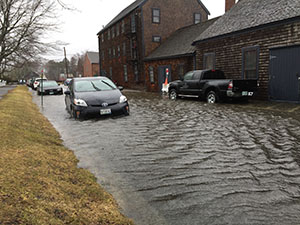Resiliency and Adaptation
Adapting to climatic changes to enable us to be more resilient.
 Our environment is no longer static and we are experiencing short and long-term consequences due to climatic changes.
Our environment is no longer static and we are experiencing short and long-term consequences due to climatic changes.
According to the 2022 New Hampshire Climate Assessment climatic changes include increased flooding with more frequent and intense precipitation events, warmer winters with decreased snowpack, and warmer seasonal and annual average temperatures.
NOAA’s National Center for Environmental Information released a State Climate Summary in 2022 for New Hampshire documenting declining snowfall, projecting unprecedented warming and increases in precipitation, and stating New Hampshire’s coastline is vulnerable to damage from winter coastal storms (nor’easters) and tropical cyclone events (hurricanes and tropical storms).
The 2023 New Hampshire State Hazard Mitigation Plan identifies that facilities across New Hampshire are at risk to increased inland and coastal flooding, extreme temperatures, high wind events, severe winter weather and more. Learn more about Climate Change.
We need to adapt our practices to enable us to be more resilient in response to these changes in our environmental conditions. We are more resilient when we can recover from extreme weather events and design our recovery efforts to be more prepared for the next event and long-term changes. State agencies, municipalities, utilities and individuals are all responding to non-static environmental conditions, including short-term extreme weather events and long-term seasonal shifts.
Coastline Resilience
 Proactive planning and action are essential to ensure that coastal New Hampshire can mitigate and adapt to worsening coastal flood hazards, such as sea-level rise, coastal storms, and extreme precipitation. Through technical assistance and partnerships, the Coastal Program and the Air Resources Division assist state and local decision-makers with adaptation and resilience planning to minimize damage and increase preparedness and resilience. The Coastal Program also works with several agencies, collaborations, and nonprofits to advance coastal resilience with programs and tools.
Proactive planning and action are essential to ensure that coastal New Hampshire can mitigate and adapt to worsening coastal flood hazards, such as sea-level rise, coastal storms, and extreme precipitation. Through technical assistance and partnerships, the Coastal Program and the Air Resources Division assist state and local decision-makers with adaptation and resilience planning to minimize damage and increase preparedness and resilience. The Coastal Program also works with several agencies, collaborations, and nonprofits to advance coastal resilience with programs and tools.
Learn more about Coastal Hazards and Adaptation.
Resilience of Drinking Water and Wastewater Systems 
Water utilities across New Hampshire have been experiencing impacts due to climatic events, like inland and coastal flooding, putting critical drinking water and wastewater infrastructure at risk. Currently, a vulnerability assessment project is underway where assessments are being conducted at several water and wastewater utilities across the state and a framework is being developed for conducting future assessments.
To view resources and learn more about how drinking water and wastewater utilities can identify hazards and assess vulnerabilities, to inform adaptation plans and to become more resilient to climatic changes, visit the NHDES Drinking Water and Wastewater Systems Resiliency webpage.




